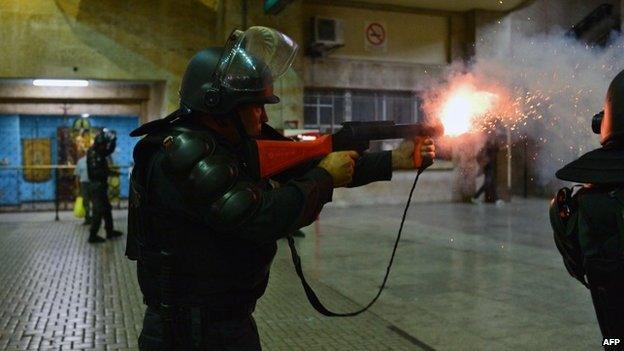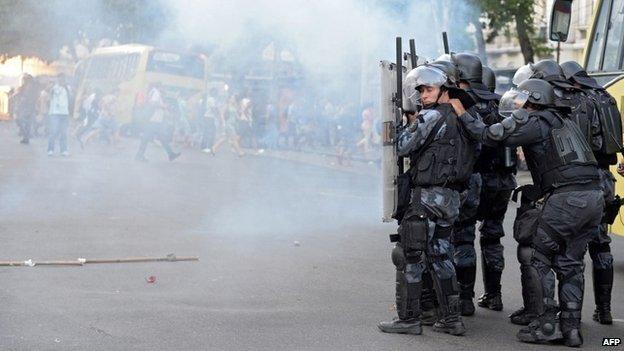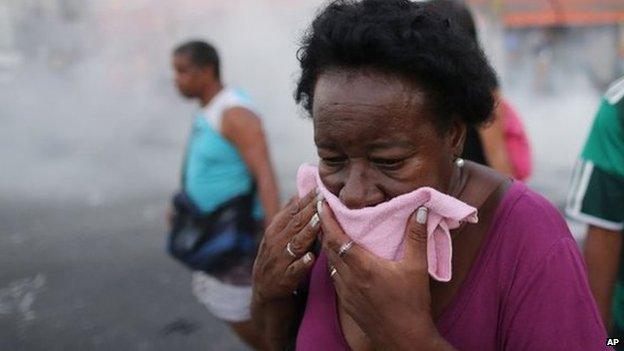Brazil: Rio protest over transport fare rise ends in violence
- Published
The BBC's Wyre Davies was reporting from Rio's Central Station as the violence unfolded
Hundreds of people in Brazil have clashed with police during a protest against increased fares for public transport.
Commuters were caught up in the violence at Rio de Janeiro's Central Station during rush hour.
Riot police fired tear gas and tried to disperse the crowd, while activists hurled stones and petrol bombs.
A cameraman is in a serious condition in hospital after suffering a head injury.
The BBC's Wyre Davies was at the station and was among those who went to the cameraman's aid.
He tweeted:, external "A fellow journalist suffered terrible head injuries when hit by explosive device. Did our best to save him."
Six other people were also injured and at least 20 protesters were arrested, O Globo newspaper reported.

Riot police fired tear gas in attempts to regain control of the situation at Central Station
Last year, similar protests grew into a nationwide movement against corruption and excessive spending ahead of the football World Cup, which Brazil will host in June and July.
Those protests began at the end of May 2013 in Sao Paulo, when the local authorities announced ticket prices would rise.
The fare increase was revoked after weeks of protests, with the federal government helping the state and municipal authorities to foot the bill.
Commuter panic
Last week, Rio's Mayor Eduardo Paes announced a 9% increase in transport fares, coming into effect on Friday.
The single bus fare goes up from 2.75 reais ($1.20; £0.70) to 3 reais ($1.30; £0.80).

The violence spread to the bus terminal outside the station and nearby streets

Rush-hour commuters were caught up in the street violence
A demonstration was called against the rise. It began peacefully, with hundreds of protesters gathering outside the Candelaria cathedral, in Rio's city centre.
They marched towards the Central Station, a major underground, train and bus hub.
"We won't pay three reais," chanted the demonstrators.
"We want Fifa-standard hospitals too," they shouted, making reference to the high standards demanded by the World Cup organisers for the event's venues.
Some activists jumped the gates and vandalised ticketing machines.
Police charged against the crowd and fired tear gas. The activists hurled petrol bombs.
The clashes took place around 18:00 local time (20:00 GMT), during the busy Rio rush hour.
There was panic inside and outside the station. Shops were vandalised, several commuters were hurt.
A cameraman covering the event for Band TV was hit in the head by an explosive device.
The moment when he was injured was caught on camera by a television crew, but it was not clear whether the device was thrown by police or the activists.
The man was taken to one of Rio's main hospitals, Souza Aguiar, near the station, in a serious condition.
He suffered skull concussion and was undergoing brain surgery, according to O Globo newspaper. He also lost part of his left ear.
The violent clashes have increased concerns about security during the World Cup, which will kick off in Sao Paulo on 12 June and will end in Rio on 13 July.
Rio will also host the 2016 Olympic Games.
- Published26 January 2014
- Published26 October 2013
- Published20 June 2013